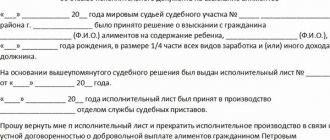Home / Alimony / Predict the result - judicial practice in collecting alimony penalties
The practice of collecting alimony penalties is contradictory. The opinions of the Constitutional and Supreme Courts, which are expressed in rulings and decisions, often contradict each other. This complicates the process of holding debtors accountable; recipients of money have doubts that they will be able to receive full compensation for improper performance of their duties by the payer.
Features of the collection procedure
Two norms come into conflict - Article 115 of the Family Code (FC) and Clause 1 of Article 333 of the Civil Code (Civil Code) of the Russian Federation. The second paragraph of the first article describes the responsibility that the payer bears in case of late payment of alimony. The specified norm of the Civil Code of the Russian Federation allows us to reduce the amount of the penalty.
We are talking about the following:
- If there is arrears in alimony payments, a penalty is charged in the amount of 0.5% of the amount of the debt (Article 115 of the Insurance Code);
- If the amount of the penalty is disproportionate, it may be reduced by court decision (Article 333 of the Civil Code).
Guided by these norms, magistrates made decisions that reduced the penalty calculated in the claim. However, in 2012, the Supreme Court indicated that in cases that relate to the fulfillment of alimony obligations, the provisions of Article 333 of the Civil Code of the Russian Federation are not allowed.
But in 2021, the Constitutional Court (CC) of the Russian Federation issued a ruling in which it indicated the following:
- When making a decision, it is necessary to maintain the level of financial support for the child as much as possible.
- Respect the interests of not only children, but also their parents.
In this regard, in the opinion of the Constitutional Court of the Russian Federation, the provisions of the above article of the Civil Code of the Russian Federation are quite applicable to protect the legal rights of alimony payers.
Family lawyers also disagree with the position of the RF Armed Forces. Even if we do not take into account the provisions of the Civil Code of the Russian Federation, Article 114 of the RF IC allows for the possibility of reducing the amount of the penalty due to untimely failure to pay alimony . The provisions of this norm are similar to the position of the Constitutional Court of the Russian Federation; they allow for a reduction in penalties upon comprehensive consideration of the payer’s position, his marital status and other circumstances worthy of attention.
For the parties, this means that there is no single algorithm that is 100% likely to lead to a win in the dispute. The process will be complex, its outcome greatly depends on the subjective opinion of the judge.
Reasons
To make claims for alimony and penalties, the recipient must have any of the following documents :
- Judgment.
- Agreement between spouses on the amount and procedure for financial support for the child.
In addition, it is recommended to provide official correspondence between the parties, which confirms the fact that the debt arose. It is often difficult to submit such letters, since debtors avoid receiving requests from the recipient of the money. But in court, it is the debtors who have to prove the fact of transferring money in a timely manner and in full. Conventionally, we can assume that for them in such a dispute there is a presumption of guilt.
Another situation is that alimony was transferred without a court decision or agreement, but then a debt arose. On the one hand, the person actually performed the duties. On the other hand, a debt has arisen, but the title document cannot be submitted to the court.
In this case, the recipient of the funds has the right to demand through the court the payment of alimony for the last three years. The amount will be determined during the meetings; the payer will hardly be able to document the fact of transferring money for this period.
That is, if the money was transferred voluntarily without confirmation, but a debt arose for one or several months, the recipient may legally demand payment of alimony for the previous three years. This is a powerful lever of influence on the payer, which allows the dispute to be resolved in favor of the child in a pre-trial manner.
There are no grounds for calculating a penalty if alimony is not transferred or is not received on time for the following reasons:
- Wages were not paid on time;
- Bank delay in transferring funds;
- An error by the employer's financial institutions or accounting;
- In other cases, which exclude the direct fault of the payer.
If the debt is repaid
This circumstance does not exempt from the accrual of penalties for timely payment of alimony. On the other hand, the court may be guided by the provisions of Articles 114 of the IC and 333 of the Civil Code of the Russian Federation and accept this fact in conjunction with other circumstances as a basis for reducing the amount of the penalty.
For the payer, repaid alimony debt (except for penalties) will mean a reduction in the base for the subsequent accrual of penalties . By delaying the resolution of the dispute, he progressively increases the debt, which is formed from the actual unpaid alimony and penalties for each month. The fact that a dispute is being considered in court does not relieve the payer from obligations to the recipient of funds, nor does it suspend them.
Arbitrage practice
So, thanks to the latest innovations, debtors have a chance to achieve a reduction or even complete cancellation of alimony debt and penalties.
But this does not mean that every unscrupulous parent will be able to write off the debt and continue to be irresponsible with monetary obligations to their children.
An example of a court refusing to reduce a penalty
Gromov's monthly income is 20,000 rubles. According to the court decision, his 14-year-old daughter should receive alimony in the amount of 5,000 rubles -¼ of her father’s earnings. During the first six months after the court decision, Gromov paid alimony. But then I lost my job. Over the next three months, the debt to my daughter accumulated - 15,000 rubles. The daughter's mother turned to the bailiff, who calculated the penalty - it amounted to 915 rubles (0.1% of the amount of debt for each day of delay), after which she filed a lawsuit to collect the debt and penalty for a total amount of 15,915 rubles. The court did not satisfy Gromov’s counterclaim for cancellation of debt due to dismissal from work and lack of income.
The court will consider the case from all sides and taking into account all the circumstances, even such as: the reason for dismissal, registration with the central bank, searching for work and other sources of income, providing all possible assistance to the child. And only if the debtor can prove that the debt arose for reasons beyond his control, will he be able to achieve a positive decision and in the future - pay alimony without fines and fabulous penalties.
An example of reducing a penalty
The mother of a 12-year-old child, Leskova, filed a claim for collection of alimony debt in the amount of 35,600 rubles and a penalty for late alimony payments in the amount of 12,000 rubles. Defendant Grigorov filed a counterclaim to reduce the amount of the penalty, since the debt arose due to a protracted illness and treatment costs; as evidence, he presented medical certificates and receipts for the purchase of drugs. Leskova argued that during his treatment, Grigorov continued to receive income from business, leasing real estate, and did not spend all his money on treatment. The court, guided by Art. 114 and 115, as well as 80 of the RF IC, according to which parents are obliged to provide for their children regardless of income, decided to reduce the amount of the penalty accrued during Grigorov’s illness to 10,000 rubles, and to pay the alimony debt in full - 35 600 rubles.
Example of exemption from penalties
Kholmogorov went to court and was charged with debt and penalties for 3 months of non-payment of alimony.
He claimed that he paid alimony exactly on time in the manner that was agreed upon with the recipient of payments - to a bank card. As evidence, Kholmogorov cited bank statements and receipts for payments made. Defendant Shahina claimed that she did not receive any money. During the trial, it became clear that the defendant’s bank wrote off the amounts of money received on the card against the loan debt, and she did not receive notifications because she changed her phone number. Based on the provisions of Article 115 of the RF IC, the court relieved Kholmogorov of the obligation to pay the accrued debt and penalty, since he was not to blame for the lack of funds in Shakhina’s account. Attention!
- Due to frequent changes in legislation, information sometimes becomes outdated faster than we can update it on the website.
- All cases are very individual and depend on many factors. Basic information does not guarantee a solution to your specific problems.
That's why FREE expert consultants work for you around the clock!
- via the form (below), or via online chat
- Call the hotline:
- Moscow and the Region
- St. Petersburg and region
- FREE for a lawyer!
By submitting data you agree to the Consent to PD Processing, PD Processing Policy and User Agreement.
Anonymously
Information about you will not be disclosed
Fast
Fill out the form and a lawyer will contact you within 5 minutes
Tell your friends
Rate ( 1 ratings, average: 5.00 out of 5)
Author of the article
Irina Garmash
Family law consultant.
Author's rating
Articles written
612
Formulas for calculating penalties for non-payment
When filing a claim or during pre-trial correspondence with the payer, it is necessary to calculate the due penalty. There are several rules, namely :
- The amount of the penalty is determined for each month.
- For the subsequent billing period, the debt for the entire previous period is included along with the penalty.
To carry out the calculation yourself, you need to apply the following formula H = C × D × 0.5/100, where :
- N – size of the penalty;
- C – amount of alimony debt for the billing month;
- D – number of overdue days.
Having calculated the penalty, you need to determine the total debt. Its size for the billing month is calculated using the following formula C=C1+H1+C2+H2+…+Cn+Hn, where:
- С1, С2, Сn – debt for payments for each overdue month of previous periods;
- Н1, Н2, Нn – penalty for the corresponding overdue month.
Thus, the second rule is observed and the penalty for the previous payment period is calculated as a penalty for the current billing period. It turns out that if the amount of payments for the financial support of the child is constant, then the amount of the penalty increases every month.
General information about calculating alimony penalties using a calculator is described in a special material. Recommended reading.
You can also apply another formula , which allows you to immediately calculate the total debt, including the amount of the penalty. It looks like this: Co=0.05×(C1×Dn+C2×Dn-1+ C2×Dn-2+ …+ Cn×D1), where:
- С1, С2, Сn – debt for payments for each overdue month of previous periods;
- Дn – number of days for the entire debt period;
- Dn-1 – number of days for the entire debt period except the first month;
- Dn-2 – number of days for the entire debt period except the first two months;
- D1 – number of days in the last month.
Using the above formulas, the plaintiff can independently calculate the amount of debt for alimony obligations, including the penalty. If an error occurs, the court will independently carry out the calculations, the plaintiff will have to agree with their result and change the requirements by filing a corresponding petition.
Algorithm of actions
As stated above, such disputes do not fall into the category of simple ones. The ambiguous position of the Supreme Court and the Constitutional Court of the Russian Federation, practicing family lawyers and judges leads to contradictory decisions. Therefore, the first stage includes :
- Collection of all documents related to the dispute;
- Seeking advice from practicing family lawyers;
- Additional collection of documents in accordance with the recommendations received;
- Pre-trial dispute resolution.
As a rule, for consultation you need to submit an agreement between the spouses on the amount and procedure for paying alimony or a court decision. Other documents are written demands or correspondence between the parties that relate to alimony payments, challenging or recognizing paternity, requests from the payer to reduce the amount of payments, etc.
For example, if the payment of funds is terminated unilaterally on the basis of non-confirmation of paternity, documents about this must be submitted to a lawyer during the consultation. It is not at all necessary that the recipient of the money is deprived of the rights to alimony, including a penalty for the debt incurred.
The pre-trial procedure for resolving a dispute helps to collect additional evidence. Correspondence, a documented fact of dishonest behavior of the payer, deprives him of the opportunity to hope for a lenient attitude from the court.
Let's find out who should calculate the penalty for alimony by reading a special article prepared by the editors of our website.
At the second stage it is necessary:
- File a claim.
- Attach to it the documents collected pre-trial, including the calculation of the penalty for the debt.
- Send a package of documents to the court.
- Defend the position set forth in the claim yourself or hire a lawyer to do so.
On the one hand, carefully prepared pre-trial work simplifies the process of filing a claim in court. On the other hand, competent defense implies, among other things, a quick response to the defendant’s actions and timely filing of the necessary petitions. This requires experience and special knowledge. Persons who are not professionally involved in jurisprudence have neither one nor the other.
If you are not satisfied with the court decision, you will have to prepare an appeal and cassation. In this case, the second stage will be delayed; more about this below.
If you are interested in the issue of drawing up an application for alimony penalties, we recommend that you read this article.
The third stage is to implement the court decision . The writ of execution is sent to the bailiffs, who take measures to collect the alimony debt and the calculated penalty. In case of significant debt, the payer is charged 50% of his earnings as repayment if he is not able to pay the debts immediately.
In some cases, it is impossible to find the alimony payer on your own, so you will have to contact law enforcement agencies, look for him through the police, tax authorities.
Bailiffs regularly need to remind themselves and build interaction with the special group that deals with alimony payers.
Malicious evaders from responsibilities for the material maintenance of children are placed under control by the Border Service of the Russian Federation, prohibiting them from leaving the country. In some cases, criminal liability is provided (Article 157 of the Criminal Code of the Russian Federation).
What should I do if my claims are denied by a court decision?
If the claim for the recovery of alimony penalties is not satisfied, the interested person may :
- File an appeal or cassation.
- Refuse further legal proceedings.
- Resume consideration of the case based on newly discovered circumstances.
- Resolve the dispute with the payer out of court.
Each of these actions depends on many factors. For example, filing a complaint with a higher authority makes sense if the court made a decision in violation of substantive and procedural law.
However, judicial practice shows that the legislator and the judiciary, by default, primarily protect the rights of children and single mothers , as well as the most vulnerable categories of the population (pensioners, disabled people) who need alimony from their relatives and friends.
Refusal of claims for payment of a penalty, as a rule, is motivated by their disproportionate or unreasonable amount. Another reason, as indicated above, is the different interpretation of the provisions of the Insurance Code and the Civil Code of the Russian Federation.
Therefore, it is necessary to review the claims and consult with practicing family lawyers regarding future prospects for the case. In such cases, the following options are possible :
- Reduce the amount of the penalty.
- Select the correct grounds for collecting the previous penalty.
- To substantiate in an appeal or cassation the violation by the court of first instance of the norms of procedural and substantive law.
As a rule, if the dispute becomes more complicated and it was not possible to resolve it in the first instance, you need to seek help from legal experts. It will no longer be possible to defend your position on payment of the calculated penalty without preparation.
How much is the penalty for alimony?
From the moment a citizen of the Russian Federation is obliged to pay money for the maintenance of a close relative (most often a minor child), he must make payments in the prescribed amount and on time. Judicial practice on alimony penalties shows that if one of the listed conditions is violated, the defaulter may be brought a civil claim in accordance with Article No. 115 of Law. Regardless of whether the other party (plaintiff) demands payments from the debtor, the violator is charged with a penalty.
Today, court proceedings are very often initiated on issues of non-payment of alimony in relation to minor children. The requirements are put forward in accordance with Article No. 115 of the Family Code. In case of delay in payment of the debt or payments in a smaller amount than established, the defaulters are charged with a penalty for non-payment of alimony.
Judicial practice on alimony penalties shows that sometimes penalties are not awarded to defaulters, for example, due to a sudden deterioration in their financial situation or serious illness. The parties can draw up an agreement together and resolve the issue of penalties. Otherwise, payments are made by court decision. It is calculated at 0.5% of the debt amount for each day.
We invite you to read: Debt collection in favor of the water utility
Penalties begin to accrue from the first day after the debtor stops making payments. For example, a party must pay monthly alimony by the 15th. In case of delay, already from the 16th there is a penalty. In addition, the guardian or parent of the child who is dependent on the minor can prove in court the fact that the lack of payments caused serious losses and demand additional compensation.










